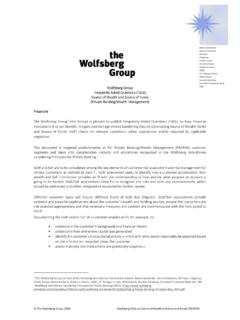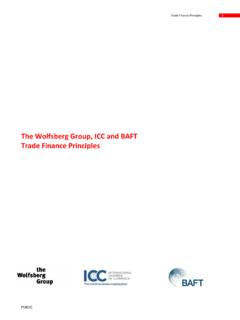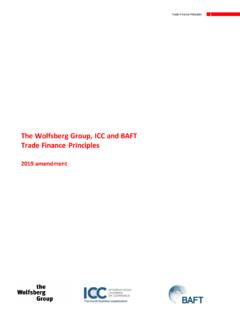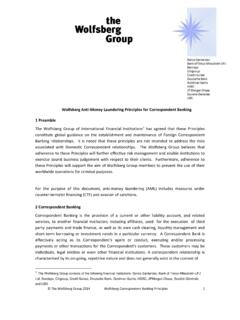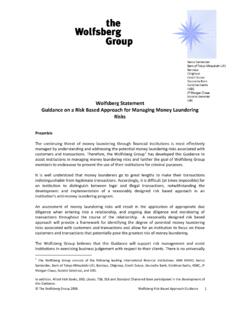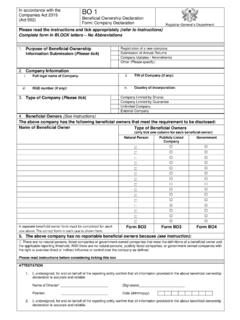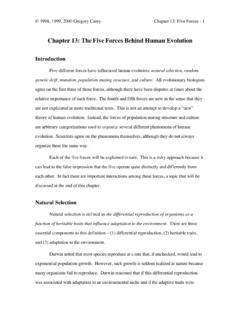Transcription of Wolfsberg Anti-Money Laundering Principles for Private ...
1 The Wolfsberg Group 2012 Wolfsberg AML Principles for Private Banking 1 Wolfsberg Anti-Money Laundering Principles for Private Banking (2012) Preamble The following Principles are understood to be appropriate for Private banking relationships. Principles for other market segments may differ. The Principles were initially formulated in 2000 (and revised in 2002) to take into account certain perceived risks associated with Private banking. Such risks continue to warrant appropriate levels of attention, no less today than ten years ago. Regulators continue to expect strong Anti-Money Laundering ( AML ) standards, robust controls, enhanced client due diligence and suitable AML policies and procedures. The Wolfsberg Group1 takes this opportunity to provide a further revision of the Principles .
2 The objectives of suitable AML policies and procedures are to prevent the use of the bank's worldwide operations for criminal purposes and to protect the firm's reputation. Such policies and procedures are designed to mitigate the risk of money Laundering and to cooperate with governments and their agencies in the detection of money Laundering . The bank will periodically assess the risk of its Private banking business and the bank's Senior/Executive Management will be made aware of these risks. It is the responsibility of Senior/Executive Management of the bank to approve written policies and procedures to address these risks, reflecting a risk based approach and to oversee the implementation of these policies, procedures and relevant controls.
3 Such policies and procedures will adhere to these Principles and will be periodically updated in light of relevant developments. 1 The Wolfsberg Group consists of the following leading international financial institutions: Banco Santander, Bank of Tokyo-Mitsubishi-UFJ Ltd, Barclays, Citigroup, Credit Suisse, Deutsche Bank, Goldman Sachs, HSBC, JPMorgan Chase, Soci t G n rale and UBS. These Principles were revised in conjunction with the Basel Institute on Governance. The Wolfsberg Group 2012 Wolfsberg AML Principles for Private Banking 2 1 Client Acceptance: General Principles General The bank will endeavour to accept only those clients whose source of wealth and funds can be reasonably established to be legitimate.
4 The primary responsibility for this lies with the Private banker who sponsors the client for acceptance. Mere fulfilment of internal review procedures does not relieve the Private banker of this basic responsibility. Bank policy will specify what such responsibility and sponsorship entail. Identification and Verification of Identity Client Identity The bank will establish the identity of its clients and beneficial owners prior to establishing business relationships with such persons. Identity is generally established by obtaining the name, date of birth (in the case of individuals), address and such further information that may be required by the laws of the relevant jurisdictions. Verification of Identity The bank will take reasonable measures to verify identity when establishing a business relationship as noted below, subject to applicable local requirements.
5 Natural persons: identity will be verified to the bank s satisfaction on the basis of official identity papers or other reliable, independent source documents, data, or information as may be appropriate under the circumstances. Corporations, partnerships, foundations: identity will be verified on the basis of documentary evidence of due organisation and existence. Trusts: identity will be verified on the basis of appropriate evidence of formation and existence or similar documentation. The identity of the trustees will be established and verified. Identification documents, if used for verification purposes, must be current at the time of opening and copies of such documents will be obtained. beneficial Owner beneficial ownership, for AML purposes, must be established for all accounts.
6 beneficial owners will ordinarily include the individuals (i) who generally have ultimate control through ownership or other means over the funds in the account and/or (ii) who are the ultimate source of funds for the account and whose source of wealth should be subject to due diligence. Mere signature authority does not necessarily constitute control for these purposes. The meaning of beneficial ownership for purposes of determining who should be subject to due diligence is dependent on the circumstances and due diligence must be done on all beneficial owners identified in applying the following Principles : Natural persons: when the account is in the name of an individual, the Private banker must establish whether the client is acting on his/her own behalf.
7 If doubt exists, the bank will establish the capacity in which and on whose behalf the accountholder is acting. Legal entities: where the client is a Private investment company, the Private banker will understand the structure of the company sufficiently to determine the provider of funds, the beneficial owner(s) of the assets held by the company and those with the power to give direction to the directors of the company. This principle applies regardless of whether the share capital is in registered or bearer 2 Legal entities that are operating companies are not addressed in these Principles . The Wolfsberg Group 2012 Wolfsberg AML Principles for Private Banking 3 Trusts: where the client is a trust, the Private banker will understand the structure of the trust sufficiently to determine (i) the provider of funds ( settlor), (ii) those who have control over the funds ( trustees), (iii) any persons or entities who have the power to remove the trustees and (iv) the persons for whose benefit the trust is established.
8 Partnerships: where the client is a partnership, the Private banker will understand the structure of the partnership sufficiently to determine the provider of funds and the general partners. Foundations: where the client is a foundation, the Private banker will understand the structure of the foundation sufficiently to determine the provider(s) of funds and how the foundation is managed. Unincorporated associations: the above Principles apply to unincorporated associations. In each of the above cases, the Private banker will make a reasonable judgment as to the need for further due diligence. Local law may characterise beneficial owners by reference to specific minimum levels of ownership. The identity of each beneficial owner will be established and, as appropriate, verified unless the identity is previously verified in accordance with the beneficial owner s role as a client.
9 Identity will be verified to the bank s satisfaction on the basis of official identity papers or other reliable, independent source documents, data, or information as may be appropriate under the circumstances. In the event verification is based on identity papers, copies of such identity papers should be obtained. " beneficial ownership," as that term may be used for other purposes, may have different meanings. Intermediaries The nature of the relationship of the bank with an intermediary depends on the type of intermediary involved: Introducing Intermediary: an introducing intermediary introduces clients to the bank, whereupon the introducing intermediary s clients become clients of the bank. The bank will generally obtain the same type of information with respect to an introduced client that would otherwise be obtained by the bank, absent the involvement of an introducing intermediary.
10 The bank s policies will address the circumstances in, and the extent to, which, the bank may rely on the introducing intermediary in obtaining this information. Managing Intermediary: a managing intermediary acts as a professional asset manager for another person and either (i) is authorised to act in connection with an account that such person has with the bank (in which case the considerations noted above with respect to introducing intermediaries would apply); or (ii) is itself the accountholder with the bank, to be treated as the client of the bank. The Private banker will perform due diligence on the introducing or managing intermediary and establish, as appropriate, that the intermediary has relevant due diligence procedures for its clients, or a regulatory obligation to conduct such due diligence, that is satisfactory to the bank.

